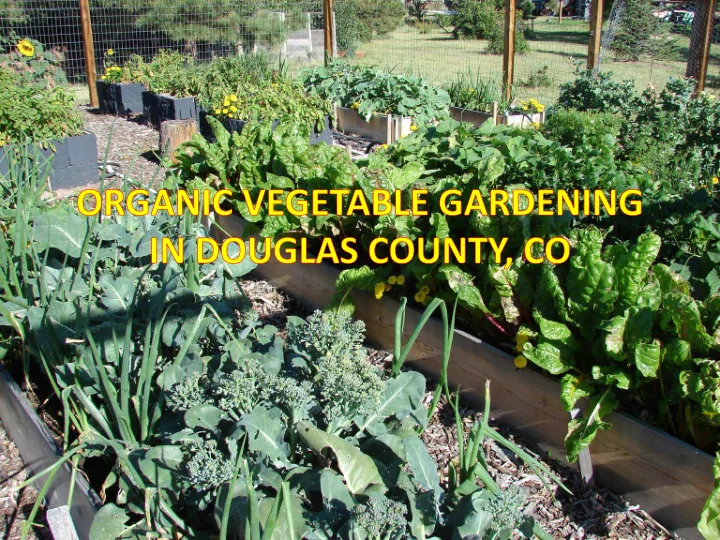

AGENDA What is Organic Gardening Fall-time Activities Soil Amendments Soils Testing Composting Documentation
“Organic Gardening” Definition Google.com has 11,200,000 links to this exact phrase The practice of organic gardening is: Using no chemical pesticides/fertilizers unless OMRI Approved Using plants and seeds that are non GMO Using home-made compost (when possible) Biodynamic Gardening- like OG, but they also believe strongly in gardening during appropriate astrological signs, religion, critical seasons of the year, etc. Natural Gardening- like OG, but not as strict in their choice of soil amendments. Permaculture Gardening- OG and the farmer can only use materials on his/her farm recycling to make compost, soil amendments, fertilizers, etc. NO BUYING!
FALLTIME ACTIVITIES Repair or Install raised beds if you don’t already have them. CAREFULLY remove all old plants, weeds, sticks from beds Send in Soil Sample for Testing Amend Soils & Mulch Start composting your kitchen scraps
SOILS TEST A soils test will tell you many things including: pH of soil (preferred is 6-7.2) Electrical Conductivity (E.C.) – Salt level Lime % Organic Material % Macro Nutrients: Lime, Organic Material , Nitrate, Phosphorus, Potassium , Sulfur , Calcium, Magnesium Micro Nutrients: Iron, Manganese, Copper , Zinc , Boron , Chloride, Molybdenum
Why is pH so Important? N K Nutrient availability N – plants ability to P absorb nutrients as K affected by soil pH; P S the wider the band, S the greater the Ca Ca absorption of Mg Mg Macro & Micro Fe Nutrients. Fe Mn B Mn Cu & Zn B Adapted from Truog, USDA Yearbook of Agriculture 1943-1047 Cu & Zn
WHY GET A SOILS TEST? Takes the guess work out! No one on the planet can look at or feel your soil and give you a product/fertilizer/amendment to get satisfactory results No two soils are the same – including your neighbors Saves money on unneeded (many times harmful) amendments You are taking a scientific approach to gardening (just like all the professional gardeners do!) Optimal production requires science – a professional soils test from an analytical lab
SOIL TESTING OPTION 1 Colorado State University – Analytical Testing Lab http://www.soiltestinglab.colostate.edu/ Click on “Horticultural Applications for Gardeners” Recommend the Routine Garden & Landscape Soil Test - $35 …and the Routine + Texture Analysis by Hydrometer Test - $13 You will get a two page report back, but does not provide details on when to add amendments, how often, or product recommendations GARDNERS MOTTO: “FEED THE SOIL NOT THE PLANTS!!!”
SOIL TESTING OPTION 2 “The Bird Man” Soils Test Solution - $200 We come take the soil samples & order soils tests from CSU We analyze results and create a custom solution for your soil An English version of the report will be provided Included – exact product(s) to purchase & where to get them! Included – Amendment Application Schedule for the Entire Season GARDNERS MOTTO: “FEED THE SOIL NOT THE PLANTS!!!”
SOIL AMENDMENTS Organic Compost – make your own Buy Class I Compost A1 Organics/Mountain States Wood Recyclers – BioComp or Ecogro Compost. Normally these are “hot” when picked up Add 4-6” on each bed, turn once (12-15”) into soil Leave dirt clots in place Mulch Water well & each month if not covered with snow until spring Do you use any other fertilizers? What fertilizers do you add and when?
FERTILIZER CHOICES GARDNERS MOTTO: “FEED THE SOIL NOT THE PLANTS!!!”
ORGANIC vs ORGANIC No OMRI tag! OMRI Certified! GARDNERS MOTTO: “FEED THE SOIL NOT THE PLANTS!!!”
COMPOST Is decayed organic material used as a plant fertilizer. Made by combining Nitrogen Mat. + Carbon Mat. + Water Turning each week adds Oxygen What is the difference between Compost & Mulch?
WHAT TO COMPOST? CARBON MATERIALS NITROGEN MATERIALS MATERIALS NOT TO COMPOST Cardboard rolls, cereal boxes, brown Animal manure ( NOT Dog, Cat, or Meat, fish, egg or poultry scraps (odor paper bags Horse ) problems and pests) Shredded Clean paper Coffee grounds and filters Dairy products (odor problems and pests) Paper towels Dryer and vacuum cleaner lint Fats, grease, lard or oils (odor problems and pests) Leaves Fruits and vegetables Coal or charcoal ash (contains substances harmful to plants) Hay and straw Grass clippings, fresh ( Pesticide Free ) Diseased or insect-ridden plants (diseases or insects might spread) Cotton and wool rags Hair and fur Pet wastes (dog or cat feces, cat litter) (might contain parasites or germs) Nut shells Fireplace ashes (Alkalizer & high K) – Yard trimmings treated with NOT recommended in Alkaline Soils! pesticides (might kill composting organisms) Crushed eggshells-not eggs (Alkalizer) Potted Plants & Houseplants Black walnut tree leaves or twigs ( Don’t Use ) (substances harmful to plants) Shredded newspaper Pumpkins Wood chips, sawdust ( very high in C ) Lake Weeds or Seaweed (rinsed) Avoid wood chips & sawdust! Tea and tea bags (minus strings) Plastic Tea Bags!
DOCUMENTATION
SAMPLE GARDEN Fenced to keep deer & bunnies out Water Source close by Hail Protection Birdhouses to attract insect eating birds Edging around entire garden to keep weeds from creeping in Completely mulched to suppress weed growth Raised beds for ease of use, better water drainage, higher temp soils
QUESTIONS? Slides located at www.birdmanusa.com/hrgc Gardening Birding & Eco Systems – Plan, Design, & Build – Bird products of all kinds – Consulting – Consulting – Soil Testing & Advise – Bat Houses – Raised Beds – Organic Insect Control – Irrigation Systems – Rodent Control Services – Deer/Critter Fences – Birdseed Delivery – Hail Protection – Woodpecker Challenges – Fertilizer Consulting – Property Plans – High Altitude Gardening – Maintenance Services – Keynote Speaker – Installation Services – Writer – Keynote Speaker – Food Preservation/Canning – Writer – …and much more – …and much more Email: birdman@birdmanusa.com Phone: 303-517-3102 Website: www.birdmanusa.com
Recommend
More recommend